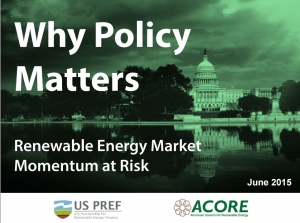Full Title: Why Policy Matters: Renewable Energy Market Momentum at Risk
Author(s): American Council on Renewable Energy (ACORE)
Publisher(s): American Council on Renewable Energy (ACORE)
Publication Date: June 1, 2015
Full Text: Download Resource
Description (excerpt):
Effective policies such as the Production Tax Credit (PTC) and Investment Tax Credit (ITC) have been key motivators of capital in the renewable energy sector. In 2014, $38 billion was invested in renewable energy in the U.S., and over $350 billion has been invested cumulatively since 2004.
These policies have enabled the rapid scale up of the renewable energy industry, and the increasing scale has driven down costs. Between 2009 and 2014, the Levelized Cost of Electricity (LCOE) for wind power has decreased by 58%; while the LCOE for solar power has decreased by 78%.
The benefits of renewable energy policy (i.e., the PTC and ITC) have largely helped consumers as utilities entered into long‐term contracts on a competitive basis for renewable energy as a hedge against rising fuel prices. The ten states with the highest percentage of renewable energy have experienced lower electricity rates and smaller rate increases. Thus, the value of the credits has accrued to ratepayers, not to large investment firms and tax equity partners.
Renewable energy policies have also created domestic supply chains that support domestic manufacturing, construction, and technology sectors and have created tens of thousands of jobs. In addition, the technologies and products developed and manufactured in the U.S. help support the global energy industry and are exported around the world.
The growing renewable energy sector has also spurred private‐sector financial innovations such as YieldCos and Green Bonds, that allow the sector to access low‐cost capital to finance continued growth. These innovations are complementary to current federal policies and will likely contract if current policies are not renewed.
The momentum of the sector is being jeopardized, however, by continuing policy uncertainty, which creates market uncertainty and inhibits long‐term investment in the sector. Investors cannot make investment decisions when policies on which these investments are based are subject to continual expiration or change. Capital craves long‐term certainty.
As a result of this policy uncertainty, wind power construction is forecast to fall by 73% and solar construction by almost 50% if current policies are allowed to expire. These steep drop offs – or market cliffs – can be avoided by the extension of current tax policies; however, year‐long extensions do not provide the optimal policy certainty needed to ensure continued investment in the
sector.
Greater policy certainty would provide a clear, stable signal to the market, motivate large amounts of capital, and allow for continued investment and growth of the renewable energy sector
